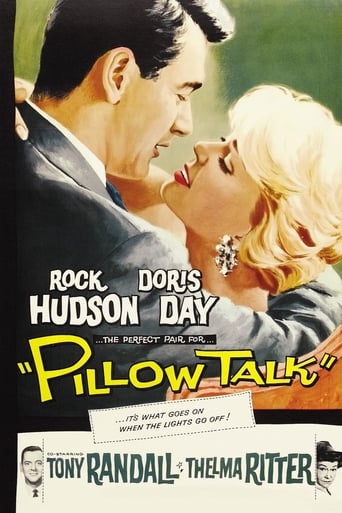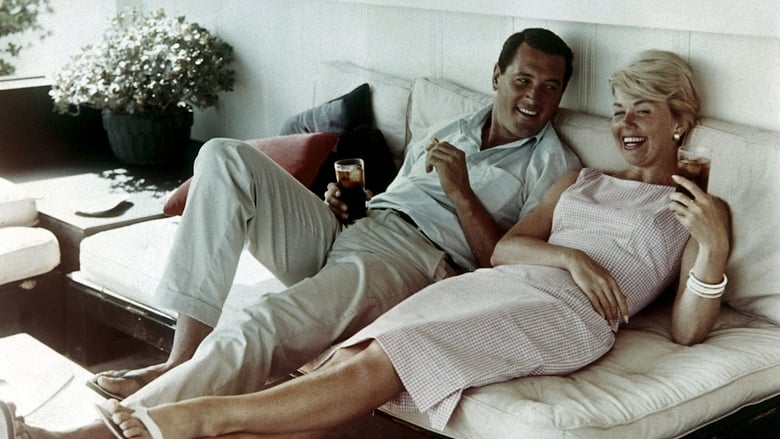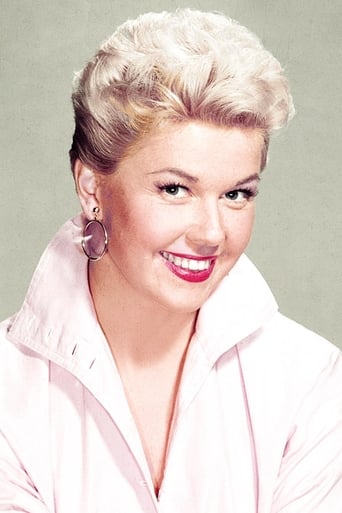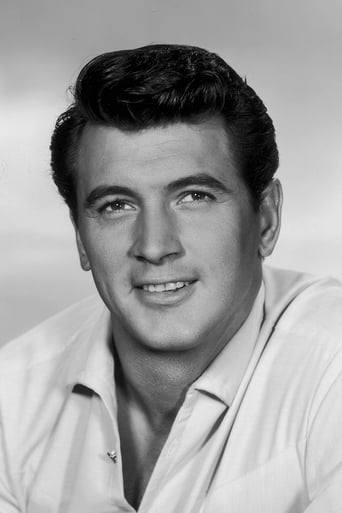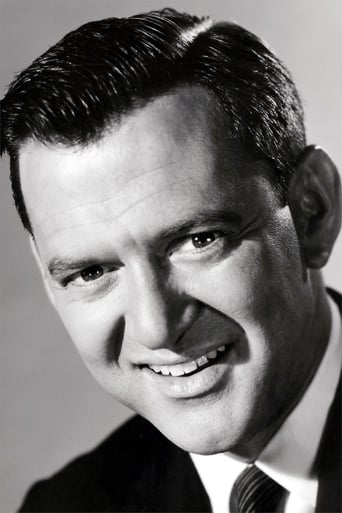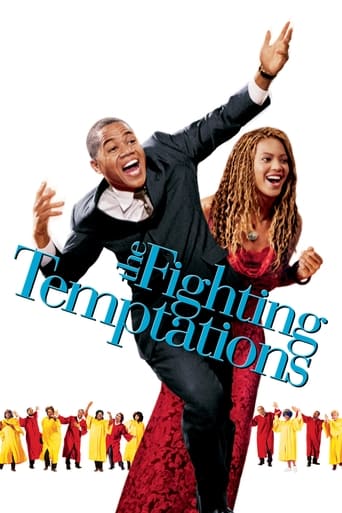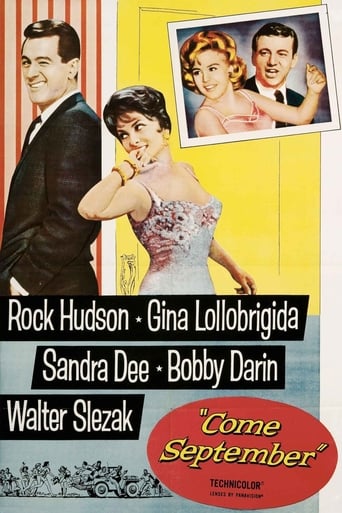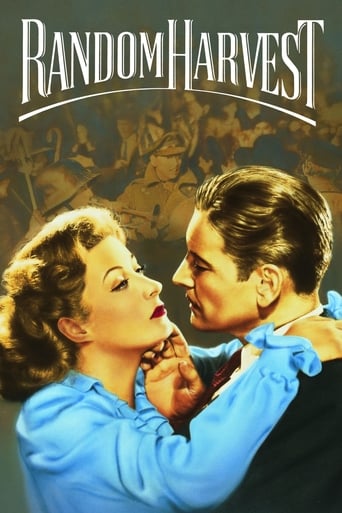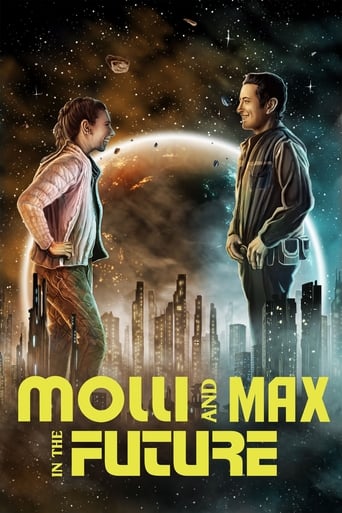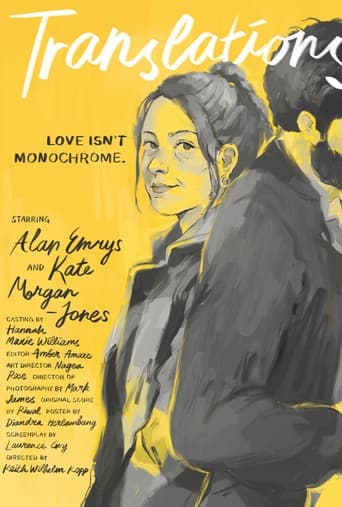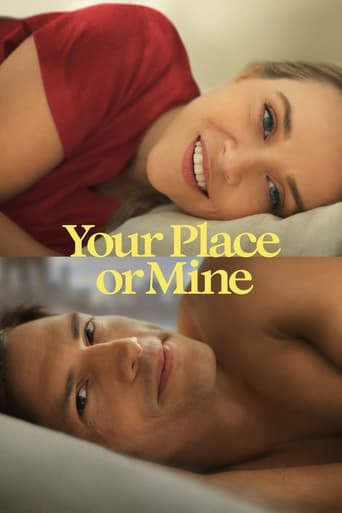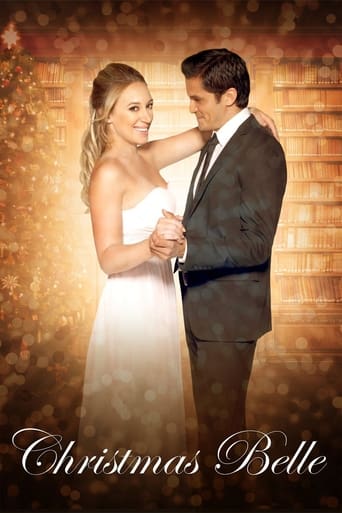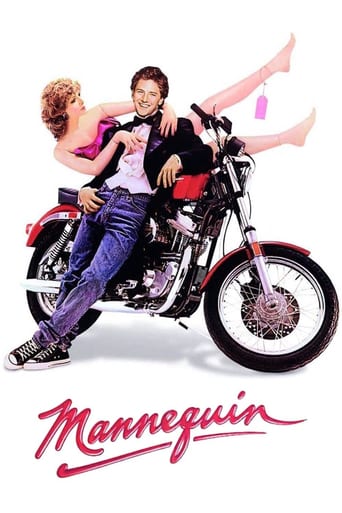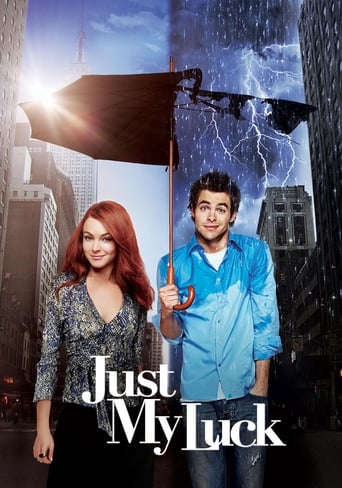Pillow Talk (1959)
Playboy songwriter Brad Allen's succession of romances annoys his neighbor, interior designer Jan Morrow, who shares a telephone party line with him and hears all his breezy routines. After Jan unsuccessfully lodges a complaint against him, Brad sets about to seduce her in the guise of a sincere and upstanding Texas rancher. When mutual friend Jonathan discovers that his best friend is moving in on the girl he desires, however, sparks fly.
Watch Trailer
Cast


Similar titles
Reviews
I am a big fan of movies both modern and classic. I like many movies despite some uncomfortable moments due to changing times and beliefs. This movie, however, I found appalling. The plot from beginning to end, promotes rape culture. It does not matter if it is a well acted movie with famous stars, it still champions faulty ideas about how men are allowed, even encouraged to treat women. Ideas that still today mislead young men into thinking their behavior is not rape. Deceive a woman, that's OK, stalk her, that's excusable, forcibly break into her apartment and kidnap her, no problem as long as you propose. She'll fall at your feet and marry you too. Think that last one doesn't happen today? It happened here in Maine about two years ago. A troubled young man kidnapped a young woman thinking she would fall in love with him when he "rescued" her. The girl ended up dead. Perhaps remembering that event colored my opinion. I still maintain that some classic movies can be enjoyed over and over, even today. Others really need to be left in the past.
Movies that were controversial during the Hollywood Golden Age are rarely still controversial in the contemptuous decade of the 2010s; Pillow Talk is yet another reminder of this notion. Back in 1959, S-E-X was on the shitlist of every major movie studio, but audiences were sickening of perfumey, sanitized entertainment. Doris Day was the epitome of that cloying wholesomeness — to the world, she was the 40 year-old virgin, a woman carrying all the sexiness of your mom. So imagine. It's 1959. You're sitting in a theater, waiting for your movie to start. Then, a preview for Pillow Talk comes on. You see Doris Day, her buttery voice in the background, singing the title theme. You automatically roll your eyes. But then, Rock Hudson, playing a womanizing cad, blames Day's hygienic uptightness on her lack of action in the bedroom. You're taken aback. Since when have "bedroom problems" been discussed in a movie?Naturally, everyone saw the film when it was released; it made $19 million (which was considered to be a blockbuster in the penny-for-an- ice-cream decade), renewed Day's status as a bona fide movie queen, and reestablished Hudson's box-office appeal. It was the talk of the town, a "racy" romantic comedy that could be charming but also risky.But now, Pillow Talk is merely a charming romantic comedy without the racy riskiness it carried in 1959. Doris Day is still about as sexy as your mom and the film is still perfumey, even if it is a little less sanitized than other rom-coms of the decade. Yet, Day and Hudson are attractive. The CinemaScope makes even the gaudiest of colors feel chic and nostalgic. The exchanges between the characters are sitcomy in an I Love Lucy way. The ballsy courageousness of Pillow Talk has severely waned over the years, but its appeal hasn't.Day portrays Jan Morrow, an interior decorator, and Hudson plays Brad Allen, a playboy musician. They live in the same apartment building and are forced to share a telephone party line; naturally, Jan accidentally interrupts many of Brad's gooey conversations with various women. She scoffs. She needs to make calls too, after all. Jan goes to the telephone company to complain, but the employee they send to resolve the situation is seduced by Brad. Of course. Jan has never seen her enemy in person, but if she did, she'd surely sock him.Well, that's what'd you think. When the two bump elbows at a local restaurant one night, Jan, unaware of who Brad actually is, is instantly smitten. Brad, meanwhile, knows who she is as his best friend is taken with her himself. But the former is surprised to find how much he is attracted to Jan, even if she does have bedroom problems. In panic, he devises a Southern accent and a fake name to fool her. Brad finds himself in quite a pickle, however, when the romance begins to take a more serious turn.The chutzpah in Pillow Talk is not balls-to-the-wall daring, but rather, hesitant, somewhat unsure of its footing. If it makes a sex joke, a double-entendre of sorts, it covers it with a sheen of CinemaScope glamour. It's a precursor to the soon-to-be sexual revolution. But if the film's gutsy movements aren't as penetrative as they once were, then there should be a much bigger focus on its stars. Day has become the underdog when reflecting on vintage films, as more attention is turned towards the voluptuous Marilyn Monroe or the exotic Sophia Loren. But she is a true talent, effortlessly at ease in her performances and radiant when she sings. She is at her best in Pillow Talk, marking a new name for herself in bright red permanent marker and knowing it will stick. The chemistry between Hudson and Day is uncomplicated and natural, transitioning smoothly from comedy foils to love interests.These days, you can see Pillow Talk's influence. Some scenes have the pupil staining pigmentation of an Almodóvar film. Others contain the split screen camera-work that would plague mod '60s capers and various television shows. If it hasn't aged well in consideration to the new age, then Pillow Talk should be seen as a template, a quintessential romantic comedy.
Jan Morrow (Doris Day) is a successful interior designer living in her cushy New York apartment, apparently content with her single life. Unfortunately for her, she shares a party line (a shared phone line) with composer and serial ladies man Brad Allen (Rock Hudson), and whenever she needs to make a call, she is always caught up in his crooning seduction technique which he tries on all the ladies. His arrogant playboy attitude riles Jan and she seeks to have the party line ended. Jan is also being wooed by millionaire client Jonathan Forbes (Tony Randall), who, unbeknownst to her, is Brad's friend and business associate. After hearing about Jonathan's infatuation with Jan, who Brad has never met, and after coincidentally coming across her in a bar, he adopts a fake Texan accent and backstory, and seduces Jan. Aiming to teach her a lesson, it's only a matter of time before his cover is blown and the possibility that he may just fall in love with her.The sight of Doris Day and Rock Hudson, with their squeaky-clean personas and rather smug characters, is usually enough to induce vomiting. However, in Pillow Talk, the first time I've seen the two together in one of their now-celebrated rom-com partnerships, I found them, and the film, a delight. Okay, so Doris Day is a tad annoying, but Rock Hudson is in great form here. Playing dual roles, he has the appeal to make his really quite nasty and obnoxious character still likable. Tony Randall, always a reliable supporting character, is great fun too.Modern-day romantic comedies should take notes from this on how to create a film with actual chemistry between the two leads, a witty script, and genuine charm. It has been attempted with films such as Down With Love and the Coen brothers' Intolerable Cruelty, but have ultimately failed to hit the mark. The film is also tightly directed by Michael Gordon, who maintains a snappy pace throughout.www.the-wrath-of-blog.blogspot.com
"Pillow Talk" had many things going for it to make it the hit it was in 1959. And, those same things are what keep it a big success with modern viewers, 50 years later. They'll likely keep it near the top of the heap in the future, especially in the comedy-romance field. After a few decades of comedy-romances with very similar plots – although many were quite funny and good – Hollywood began to put out more original comedy plots in the 1950s. PT was one of those. It won the Oscar that year for Best Writing, Story and Screenplay—Written Directly for the Screen. The plot was simple and not hard to follow. Indeed, part of the enjoyment is in seeing how it unfolds as we are led from one scene to the next. And, then we can catch the one-liners and zingers that bring out the long bursts of laughter. I say bursts, because even after seeing this movie a few times, I still laugh so hard in places that I miss many subsequent lines and have to go back to resume the film (of course, we couldn't do that in the theater original, or when viewing it live on TV). PT is a classic comedy-romance that should endure through the ages. All of the cast give top performances, the directing is superb, and the sets and scenes are spot-on. With all of this, the witty writing and dialog delivery stand out and provide the real punch. One must see the film to appreciate the expressions of Rock Hudson, Doris Day, Tony Randall, Thelma Ritter or the nurse and doctor, with delivery of so many laughter lines. Here's just a small sample of laughter starters: Hudson to Day: "We have a saying back in Texas, ma'am — 'Never drink anything stronger than you are, or older.'" Hudson to Day, on his warm feeling around her: "It's like being around a pot-bellied stove on a frosty mornin'." Day, when the phone company sends a woman agent to check a complaint against Hudson: "It's like sending a marshmallow to put out a bonfire." Randall to Day: "And even the air out there (in Texas), there's nothing in it but air. In New York you've got air you can sink your teeth into. It has character." Randall: "I don't know how fast he works, but it takes an early bird to get the best of a worm like me."Randall to Hudson: "You love her and she can't stand the sight of you. Heh, heh, heh. It's wonderful." Hudson: "Jonathan, how do I get her back?" Randall: "You don't. That's the beauty of it. You suffer and I watch." Randall, seeing a photo from his private investigator: "Why, this is my best friend." Private eye: "Yep. They're usually the ones."

